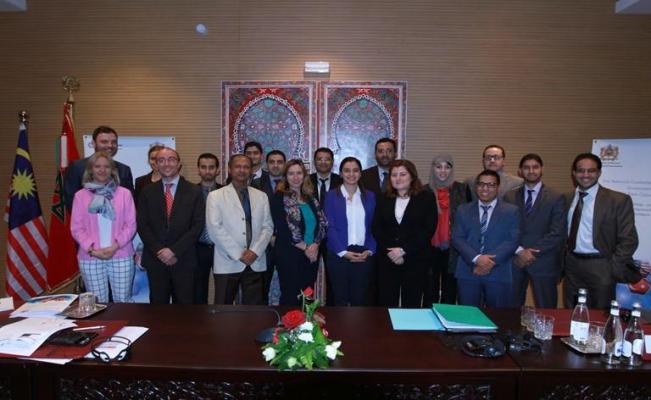
The National Committee for Business Environment (CNEA) organised in collaboration with the World Bank, a workshop for the exchange of international best practice with regard to the development of the private sector and improvement of the business environment on 07 - 10 December 2015 in Rabat.
This workshop was attended by representatives from the United Kingdom , Malaysia, Montenegro and Turkey, and inaugurated by the Head of Government, in the presence of the Minister of Economy and Finance, the deputy minister in charge of the Budget, the deputy minister in charge of Foreign Trade, the World Bank Director of Operations for the Maghreb, the President of the Professional Association of Moroccan Banks (GPBM) , and representatives from the General Confederation of Moroccan Companies (CGEM) .
In his address, the Head of Government said that the Moroccan macroeconomic framework has regained its stability following the various actions and measures taken by the government, including in particular, the reform of the compensation fund and the significant improvement in the business climate. « However, we recognise that more work needs to done within the framework of this project, as it is the duty of the administration to clear the way for any investor able to contribute to the growth of the national economy and ensure that the population feels the effects of these efforts », acknowledged the Head of Government before specifying that «Such workshop gives us further incentive to pursue this avenue with more determination and constitutes a new start particularly with regard to good practices for improving business climate. ».
For his part, the CGEM representative reported on the progress made in improving the business climate, notably as regards facilitating investment and simplifying import/export procedures, which will have positive impact on the country's ranking in international reports.
The purpose of this workshop was to provide the CNEA's members and its partners with international techniques, tools and practices in order to help them better identify, manage, assess and communicate on reform projects in the area of business environment in Morocco.
Besides the CNEA, this workshop saw also the participation of four similar entities, which are:
- Better Regulation Delivery Office (BRDO) - the United Kingdom;
- Regulatory Impact Unit (RIU) - Montenegro;
- the Turkish Coordination Council for the Improvement of the Investment Environment (YOIKK);
- and the Malaysia’s Performance Management and Delivery Unit (PEMANDU).
This meeting was a great opportunity for experts from different participating countries to exchange views on approaches, techniques and practices in the field of business climate development in close collaboration with the relevant stakeholders. Discussions focused on the four following topics:
- Identification of constraints felt by the economic operators and professionals from the private sector: The attending experts presented their good practices and experiences in terms of identifying difficulties facing the company and the mechanisms they put in place to ensure continuous feedback on constraints to entrepreneurship. In this respect, the experts presented the tools used (enterprise surveys, public-private dialogue platforms, web portals, technological applications, Barometers, etc.) as well as other channels used in this sense such as international reports and rankings;
- The development of a medium-term business environment reform strategy broken down into annual operational action plans: Experts shared their experiences in developing strategies for improving the business environment, based on the analysis and identification of the main obstacles to private sector growth and investment. The process under which their countries have succeeded in better integrating their own reform actions into existing national strategies was also presented
- The implementation of reform projects and monitoring of actions: the various speakers discussed experiences related to the process of implementing reform projects and coordinating reform programmes involving several stakeholders from both the public and private sectors. In addition, the four participating countries provided more details on their monitoring methods for evaluating the activities and results of the projects in relation to the objectives set;
- Communication and commitment of stakeholders: innovative approaches to communication on reforms and with the various stakeholders were also the subject of an exchange of views between the various participants in this event. It was also a great occasion for the CNEA members to learn about the experiences of the four attending entities, and draw up a set of recommendations capable of ensuring better coordination of the reforms initiated by the committee and improving its institutional positioning.
At the institutional level, the CNEA is called upon to take into account regional and sectoral aspects as well as the representativeness of other actors from the private sector, through:
- setting up coordination mechanisms between the National Committee for Business Environment and the other Regional Committees for Business environment
- Establishing technical commissions by theme and economic sector
- Establishing a body at the level of the CNEA for the legal and regulatory component which will be in charge of measuring the regulatory impact of the reforms;
- Improving the participatory approach's design and implementing reforms
- Integrating the academic environment into the work of the committee
At the strategic level, the CNEA is called upon to adopt a medium-term strategy for improving the business environment, through:
- Conducting field surveys with companies with the aim of identifying projects/constraints;
- Prioritising the main constraints to entrepreneurship and to the development of an action plan over 4 or 5 years for improving the business environment;
- Reassessing business regulations
- Establishing a coordination mechanism between the business climate strategy and sectoral strategies
At the operational level, the efficiency of reforms initiated by the CNEA will be further increased through improved application of a set of project management tools and methods.
In this regard, three areas of operational improvement have been identified:
- Capacity-building for the members of the CNEA secretariat in terms of project management according to internationally recognized methods
- The wide use of the collaborative work platform for the benefit of all project managers;
- The implementation of a communication strategy on the reforms undertaken in relation to the Committee's work.



